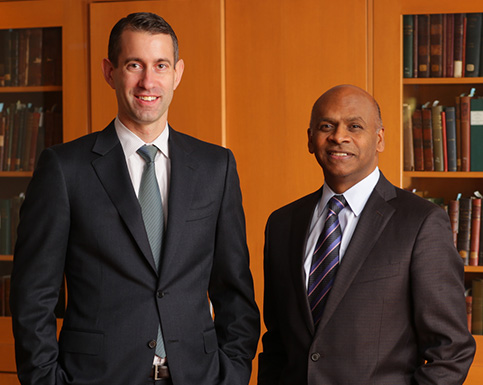Trauma
Leaders in the Field
A Resource for Trauma Training
Physicians from around the world come to the Trauma Training Center at Columbia to learn the most advanced principles and techniques related to trauma care. The Center, established by Melvin P. Rosenwasser, MD, more than 25 years ago, also serves as a clinical research laboratory for orthopedic trauma, hand, and upper extremity surgery. These studies are supported by a large fracture database that allows for longitudinal investigations and long-term follow-up. In addition, physician-scientists perform research studies in this state-of-the-art facility to determine new approaches for optimizing outcomes for severely injured patients.
Global Health Efforts in Trauma Care

Dr. H. John Cooper and Dr. R. Kumar Kadiyala
Dr. Rosenwasser is a member of the Consortium of Orthopaedic ACademic Traumatologists (COACT), which seeks to promote global health efforts in musculoskeletal trauma care through the sharing of best practices, research opportunities, mentorship, and resources. A surgical team from Columbia Orthopedics, in conjunction with the Foundation for Orthopedic Trauma, sponsors a mission to Haiti each year combining surgical care with local teaching.
Enhancing Regional Trauma Care
Under the leadership of Justin K. Greisberg, MD, Chief of the Foot and Ankle Service and a trauma specialist at Columbia, NewYork-Presbyterian Lawrence Hospital now provides the same high level trauma care to residents of Westchester County. The regional trauma team is equipped with the latest techniques and technologies in order to address any orthopedic trauma cases, including complex fractures.
Standardizing Protocols for Geriatric Hip Fracture
A multidisciplinary team led by trauma surgeon R. Kumar Kadiyala, MD, PhD, and H. John Cooper, MD, a specialist in hip and knee reconstruction, has established a standardized protocol in the management of hip fracture in the elderly that is being implemented throughout NewYork-Presbyterian. Studies have shown that hip fractures treated in an expeditious manner have better overall outcomes for patients. Components of the protocol include expediting surgery within 24 to 48 hours of presentation using anterior approach hip arthroplasty for displaced femoral neck fractures. The anterior approach minimizes soft tissue damage, allowing patients to mobilize more quickly.
In a study published in the July 2018 issue of The Journal of Arthroplasty, Dr. Cooper and his colleagues examined the variation in treatment patterns of displaced femoral neck fractures to determine how they correlated with resource utilization relevant to a value-based episode-of-care model. The retrospective study looked at 1,139 femoral neck fractures treated with hip arthroplasty at seven hospitals, with a focus on procedure (hemiarthroplasty versus total hip arthroplasty), surgeon training status, admitting service, and time to surgery. The researchers observed significant variation across the hospitals and identified treatment choices that associated with resources utilization within the 30-day episode of care. They noted that a prospective study is necessary to understand whether care pathways that adapt some combination of these characteristics may result in more value-based care.



